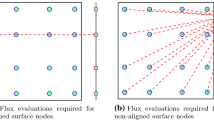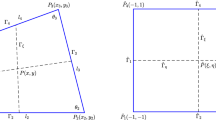Abstract
Finite element methods (FEMs) on nonconforming meshes have been much studied in the literature. In all earlier works on such methods , some constraints must be imposed on the degrees of freedom on the edge/face with hanging nodes in order to maintain continuity, which make the numerical implementation more complicated. In this paper, we present two FEMs on quadrilateral nonconforming meshes which are constraint-free. Furthermore, we establish the corresponding residual-based a posteriori error reliability and efficiency estimation for general quadrilateral meshes. We also present extensive numerical testing results to systematically compare the performance among three adaptive quadrilateral FEMs: the constraint-free adaptive \(\mathbb Q _1\) FEM on quadrilateral nonconforming meshes with hanging nodes developed herein, the adaptive \(\mathbb Q _1\) FEM based on quadrilateral red-green refinement without any hanging node recently proposed in Zhao et al. (SIAM J Sci Comput 3(4):2099–2120, 2010), and the classical adaptive \(\mathbb Q _1\) FEM on quadrilateral nonconforming meshes with constraints on hanging nodes. Some extensions are also included in this paper.










Similar content being viewed by others
Notes
Here we do not consider the adaptive moving-mesh method, which can be used on quadrilateral and hexahedral meshes without any hanging nodes.
For the classical constrained FEMs on nonconforming meshes, there are two approaches to assemble stiffness matrix. One is assembling a saddle matrix through an elementwise computation which is based the original bases functions including bases function on hanging nodes, and then eliminating the constraints in the saddle matrix to reduce to a symmetric matrix (the bilinear form is symmetric). The other one is modifying the bases functions as a“macro-element” on regular nodes (add a half of the basis function on a hanging node to the two bases functions on the corresponding two regular nodes, see (5.6) in [30]) and remove all the bases functions on hanging nodes, and then assembling the stiffness matrix with the modified bases functions on regular nodes, which automatically generates a symmetric matrix (the bilinear form is symmetric). Cite Sect. 5 in [30]. However, the well-used element-wise assembly technique is lost in assembling stiffness matrix in the latter approach if using modified bases functions.
References
Ainsworth, M.: Robust a posteriori error estimation for nonconforming finite element approximation. SIAM J. Numer. Anal. 42, 2320–2341 (2005)
Ainsworth, M., Demkowicz, L., Kim, C.W.: Analysis of the equilibrated residual method for a posteriori error estimation on meshes with hanging nodes. Comput. Methods Appl. Mech. Eng. 196, 3493–3507 (2007)
Ainsworth, M., Oden, J.T.: A posteriori error estimation in finite element analysis. In: Pure and Applied Mathematics. Wiley-Interscience, Wiley, New York (2000)
Alonso, A.: Error estimators for a mixed method. Numer. Math. 74(4), 385–395 (1996)
Arnold, D.N., Mukherjee, A., Pouly, L.: Locally adapted tetrahedral meshes using bisection. SIAM J. Sci. Comput. 22(2), 431–448 (2000)
Babuska, I., Rheinboldt, W.C.: Error estimates for adaptive finite element computations. SIAM J. Numer. Anal. 15, 736–754 (1978)
Bank, R.E., Sherman, A.H., Weiser, A.: Refinement algorithms and data structures for regular local mesh refinement, scientific computing. In: Stepleman, R.S. (ed.) Applications of Mathematics and Computing to the Physical Sciences, pp. 3–17. North-Holland, Amsterdam (1993)
Bänsch, E.: Local mesh refinement in 2 and 3 dimensions. Impact Comput. Sci. Eng. 3, 181–191 (1991)
Binev, P., Dahmen, W., DeVore, R.: Adaptive finite element methods with convergence rates. Numer. Math. 97, 219–268 (2004)
Carstensen, C.: A posteriori error estimate for the mixed finite element method. Math. Comp. 66(218), 465–476 (1997)
Carstensen, C., Bartels, S., Jansche, S.: A posteriori error estimates for nonconforming finite element methods. Numer. Math. 92, 233–256 (2002)
Carstensen, C., Hu, Jun: A unifying theory of a posteriori error control for nonconforming finite element methods. Numer. Math. 107, 473–502 (2007)
Chen, Z., Dai, S.: On the efficiency of adaptive finite element methods for elliptic problems with discontinuous coefficients. SIAM J. Sci. Comput. 24, 443–462 (2002)
Choi, C.K., Park, Y.M.: Nonconforming transition plate bending elements with variable mid-side nodes. Comput. Struct. 32, 295–304 (1989)
Dari, E., Duran, R., Padra, C.: Error estimators for nonconforming finite element approximations of the Stokes problem. Math. Comp. 64(211), 1017–1033 (1995)
Dari, E., Duran, R., Padra, C., Vampa, V.: A posteriori error estimators for nonconforming finite element methods. Math. Model. Numer. Anal. 30, 385–400 (1996)
Heuveline, V., Schieweck, F.: \(H^1\) -interpolation on quadrilateral and hexahedral meshes with hanging nodes. Computing 80, 203–220 (2007)
Huang, F., Xie, X.: A modified nonconforming 5-node quadrilateral transition finite element. Adv. Appl. Math. Mech. 2(6), 784–797 (2010)
Kellogg, R.B.: On the Poisson equation with intersecting interfaces. Appl. Anal. 4, 101–129 (1975)
Kossaczký, I.: A recursive approach to local mesh refinement in two and three dimensions. J. Comput. Appl. Math. 55, 275–288 (1994)
Leitner, E., Selberherr, S.: Three-dimensional grid adaptation using a mixed-element decomposition method. In: Ryssel, H., Pichler, P. (eds.) Simulation of Semiconductor Devices and Processes, vol. 6, pp. 464–467. Springer, Berlin (1995)
Maubach, J.: Local bisection refinement for n-simplicial grids generated by reflection. SIAM J. Sci. Comput. 16(1), 210–227 (1995)
Mitchell, W.F.: Adaptive refinement for arbitrary finite element spaces with hierarchical basis. J. Comput. Appl. Math. 36, 65–78 (1991)
Molino, N., Bridson, R., Teran, J., Fedkiw, R.: A Crystalline, Red Green Strategy for Meshing Highly Deformable Objects with tetrahedra. In: 12th international meshing roundtable. Sandia National Laboratories pp 103–114 (2003)
Morin, P., Nochetto, R.H., Siebert, K.G.: Data oscillation and convergence of adaptive FEM. SIAM J. Numer. Anal. 38, 466–488 (2000)
Plaza, A., Carey, G.F.: Local refinement of simplicial grids based on the skeleton. Appl. Numer. Math. 32(2), 195–218 (2000)
Rivara, M.C.: Mesh refinement processes based on the generalized bisection of simplices. SIAM J. Numer. Anal. 21, 604–613 (1984)
Rivara, M.C., Iribarren, G.: The 4-triangles longest-side partition of triangles and linear refinement algorithms. Math. Comput. 65(216), 1485–1501 (1996)
Rosenberg, I.G., Stenger, F.: A lower bound on the angles of triangles constructed by biseciting the longest side. Math. Comp. 29, 390–395 (1975)
Zhao, X.Y., Mao, S.P., Shi, Z.C.: Adaptive quadrilateral and hexahedral finite element methods with hanging nodes and convergence analysis. J. Comput. Math. 28(5), 621–644 (2010)
Zhao, X.Y., Mao, S.P., Shi, Z.C.: Adaptive finite element methods on quadrilateral meshes without hanging nodes. SIAM J. Sci. Comput. 32(4), 2099–2120 (2010)
Zhao, X.Y.: Red-green-type refinements, nonconforming elements, quadrilateral hanging-node-free and constraint-free adaptive methods (in Chinese). PhD dissertation, Library of Academy of mathematics and systems science, Chinese Academy of Sciences, May (2010)
Acknowledgments
The research was supported by National Nature Science Foundation of China grant 11201462, and National Nature Science Foundation of China grant 11371359, and U.S. Department of Energy grant DE-SC0005346, and U.S. NSF grant DMS-1016073.
Author information
Authors and Affiliations
Corresponding author
Rights and permissions
About this article
Cite this article
Zhao, X., Shi, ZC. & Du, Q. Constraint-Free Adaptive FEMs on Quadrilateral Nonconforming Meshes. J Sci Comput 59, 53–79 (2014). https://doi.org/10.1007/s10915-013-9753-5
Received:
Revised:
Accepted:
Published:
Issue Date:
DOI: https://doi.org/10.1007/s10915-013-9753-5
Keywords
- Adaptive finite element
- A posteriori error estimate
- Quadrilateral
- Nonconforming
- Hanging node
- Constraint-free




